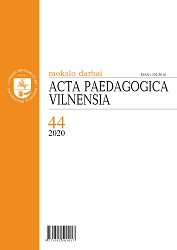Šiuolaikinės mokymo(si) strategijos aukštosiose mokyklose: komandomis grįstas mokymas(is)
Modern Learning Strategies in Higher Education: Team-Based Learning
Author(s): Birutė Aleksandravičiūtė, Kęstutis LiekisSubject(s): Higher Education , Educational Psychology, Methodology and research technology
Published by: Vilniaus Universiteto Leidykla
Keywords: Team-based learning; active learning; higher education;
Summary/Abstract: Team-based learning is a student-orientated active learning strategy created by Lary Michaelsen in 1979. Team-based learning is widely used not only in the United States of America, but all around the world: in Asian, European, and Middle Eastern universities and colleges. It is extremely popular in biomedicine as well as in social sciences. It is, unfortunately, rare in Lithuanian higher education. There is a large network of team-based learning strategy consultants in Singapore, Japan, Australia, the Netherlands, the United Kingdom, Uruguay, and North America. Research aim: to introduce the team-based learning strategy. Research questions: what is team-based learning strategy? What are the main reasons of the prevalence of team-based learning strategies? How is the team-based learning strategy adopted to the learning subject? Research object: Team-based learning strategy. Research method: literature analysis. The popularity of team-based learning is determined by its effectiveness: it motivates students, ensures their involvement, develops critical thinking, problem-solving, interpersonal leadership, and conflict management and similar skills. Team-based learning ensures the satisfaction of students with the learning process. There are four essential elements of the team-based learning strategy: teams must be properly formed and managed; students must be motivated to attend class and must come prepared; students must learn to use course concepts to solve problems; students must be truly accountable in case the lecturer decides to implement team based learning into their subject.
Journal: Acta Paedagogica Vilnensia
- Issue Year: 2020
- Issue No: 44
- Page Range: 141-151
- Page Count: 11
- Language: Lithuanian

